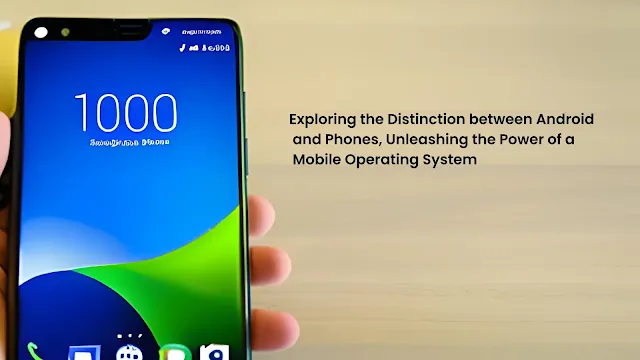Introduction:
In the ever-evolving world of smartphones, the terms "Android" and "phone" are often used interchangeably. However, it's essential to understand the fundamental difference between the two. Android is an operating system specifically designed for mobile devices, developed by Google. On the other hand, a phone refers to the physical device itself. In this article, we will delve into the unique features of Android, its impact on user experience, advantages over other operating systems, customization capabilities, and how its open-source nature fuels innovation in the smartphone industry.
Understanding Android: Beyond the Hardware:
Android is more than just a piece of hardware; it is the software that powers the phone, serving as the underlying operating system. It provides the interface through which users interact with various features and applications.
The Inner Workings of Android on Smartphones:
Android acts as a bridge between the hardware and software components of a smartphone. It offers a user-friendly interface, enabling seamless interaction through touchscreen gestures, buttons, and other input methods. Additionally, Android supports multitasking, allowing users to effortlessly switch between applications and run multiple apps concurrently.
Key Features Distinguishing Android from Other Platforms:
- Open-source nature: Android's open-source nature, built on the Linux kernel, allows developers to modify and customize its source code, fostering a collaborative environment.
- Extensive app ecosystem: The Google Play Store offers millions of applications, providing users with an extensive range of choices.
- Customizability: Android empowers users to personalize their devices by customizing the appearance, home screen layout, and system settings.
- Seamless integration with Google services: Android seamlessly integrates with various Google services, enhancing the user experience by connecting users to a suite of Google products.
Enhancing User Experience through Android:
Android significantly contributes to the overall user experience on smartphones. With its user-friendly interface, intuitive navigation, and notification systems, Android creates a cohesive environment. The availability of a vast array of applications and services allows users to enhance productivity, entertainment, and communication. Android's support for different connectivity options ensures users can easily access online resources and stay connected.
Advantages of Android-powered Phones:
- Device variety: Android offers a wide range of smartphones from different manufacturers, catering to various price points, features, and designs.
- Customization options: Android empowers users to personalize their devices by customizing the appearance, settings, and home screen layout.
- Rich app selection: The Google Play Store hosts an extensive collection of applications, providing users with a diverse range of productivity, entertainment, and communication tools.
- Seamless Google integration: Android seamlessly integrates with Google services, facilitating a unified experience across multiple Google products.
Exploring Phone Platforms: Beyond Android:
Although Android is widely used, it is important to note that not all smartphones run on this operating system. Alternatives like Apple's iOS, Microsoft's now-discontinued Windows Phone, KaiOS for feature phones, and various proprietary operating systems exist, offering different experiences and features.
Impact on App Development and Availability:
Android's open-source nature and its large user base have a significant impact on app development and availability. The availability of a Software Development Kit (SDK) empowers developers to create, test, and distribute applications. The Google Play Store serves as a platform for developers to publish their apps, ensuring a wide reach to millions of Android users worldwide.
Customization and Personalization: Android's Edge:
One notable aspect that sets Android apart from other platforms is its flexibility in customization and personalization. Users can modify home screen layouts, add widgets, choose different launchers, apply themes, and even set live wallpapers, allowing for a unique and personalized experience. In contrast, other platforms may offer limited customization options, providing a more consistent interface.
Open-Source Fueling Innovation in the Smartphone Industry:
Android's open-source nature fuels innovation in the smartphone industry. The availability of the source code encourages developers to modify, enhance, and contribute to its development, fostering a collaborative environment. This enables the creation of custom versions of Android and the addition of new features, driving diversity and innovation in hardware and software.
Conclusion:
Understanding the distinction between Android and phones is vital in comprehending the underlying technology that powers our mobile devices. Android's role as a mobile operating system provides a user-friendly interface, diverse customization options, an extensive app ecosystem, and seamless integration with Google services. With its open-source nature, Android enables innovation, resulting in a dynamic and ever-evolving smartphone industry. As users continue to embrace the possibilities of Android, the future holds exciting prospects for further advancements in mobile technology.
Read More Information on https://www.teknomedan.com/

